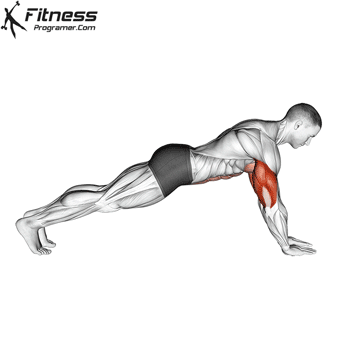Overview
The forearm push-up is a push-up variation where the forearms are used instead of the hands, placing greater emphasis on shoulder stability, triceps engagement, and core activation.
It is commonly used by:
Athletes looking to improve upper body strength and stability
Calisthenics and bodyweight training enthusiasts
Individuals working on shoulder and core endurance
How to Perform the Forearm Push-Up

Step 1: Setup
Start in a forearm plank position with your elbows directly under your shoulders.
Keep your forearms flat on the ground with palms facing down or in a neutral position.
Engage your core, glutes, and legs to maintain a straight body line from head to heels.
Step 2: Execution
Lower your body by bending your elbows, bringing your torso toward the ground while keeping your forearms on the floor.
Maintain a tight core and neutral spine to prevent excessive arching or sagging.
Press through your forearms and elbows to push yourself back to the starting position.
Repeat for the desired number of reps while maintaining controlled movement.
Tips for Proper Form
Keep your core engaged to prevent lower back sagging.
Maintain a straight line from your head to your heels throughout the movement.
Control the lowering and pushing phases to maximize muscle engagement.
Avoid excessive flaring of the elbows; keep them at about a 45-degree angle to your torso.
Breathe consistently, exhaling as you push up and inhaling as you lower down.
Common Mistakes to Avoid
Allowing the hips to drop, which reduces core engagement and may cause lower back strain.
Lifting the elbows off the ground, which shifts the focus away from the intended muscles.
Shrugging the shoulders, which can lead to excessive tension in the neck and traps.
Holding the breath, which can reduce stability and endurance.
Moving too quickly, leading to poor form and decreased effectiveness.
Benefits of the Forearm Push-Up
1. Strengthens the Upper Body
The forearm push-up primarily targets the chest, triceps, and shoulders, helping to build upper-body strength and endurance.
2. Enhances Core Stability
Since the forearm push-up requires a plank-like position, it effectively strengthens the core muscles, including the abs and obliques.
3. Improves Shoulder Stability
The forearm position increases shoulder control and scapular stability, making it a valuable exercise for athletes and functional fitness enthusiasts.
4. Enhances Body Awareness and Control
Performing push-ups on the forearms requires better proprioception and muscular control, leading to improved movement mechanics and coordination.
How to Incorporate Into Your Routine
For Strength: Perform 3 to 4 sets of 6 to 10 reps with a slow tempo.
For Endurance: Perform higher reps (10 to 15) with controlled form.
As Part of a Push-Up Progression: Use this exercise alongside plank push-ups, diamond push-ups, and archer push-ups to develop pressing strength.
For Core Training: Pair it with planks, hollow body holds, or leg raises to maximize core engagement.
Forearm Push-up Muscles Worked

